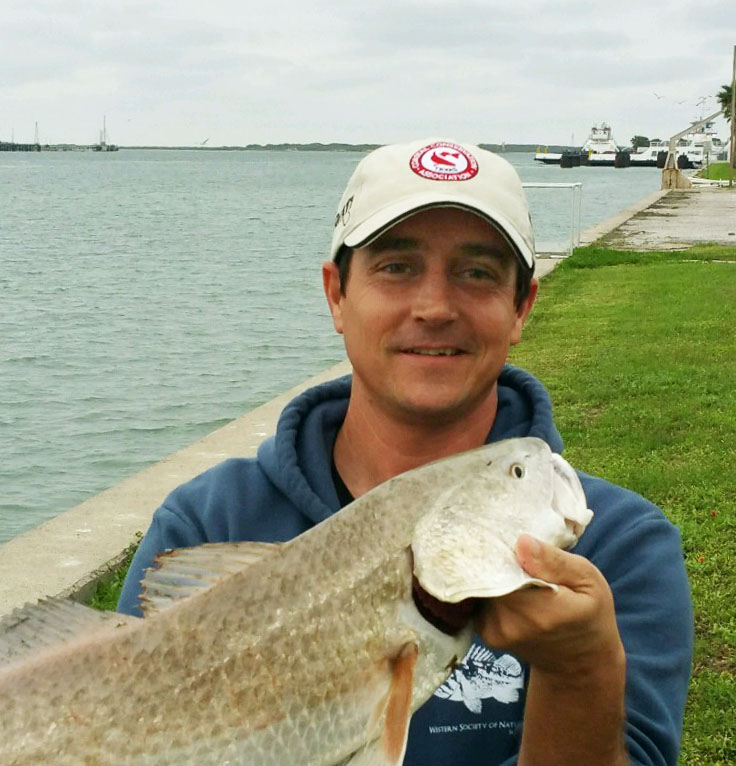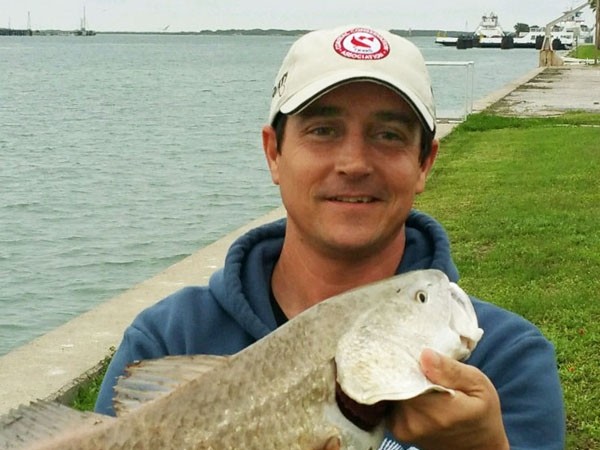 Dr. Brad Erisman will use the fellowship better understand fish spawning aggregations. Courtesy photo.The Gulf Research Program of the National Academies of Sciences, Engineering, and Medicine announced today that Dr. Brad Erisman is one of a select few recipients of its Early-Career Research Fellowships and Science Policy Fellowships for 2016. These competitive awards are among the suite of activities in the program’s 30-year mission to enhance oil system safety and the protection of human health and the environment in the Gulf of Mexico and U.S. outer continental shelf regions.
Dr. Brad Erisman will use the fellowship better understand fish spawning aggregations. Courtesy photo.The Gulf Research Program of the National Academies of Sciences, Engineering, and Medicine announced today that Dr. Brad Erisman is one of a select few recipients of its Early-Career Research Fellowships and Science Policy Fellowships for 2016. These competitive awards are among the suite of activities in the program’s 30-year mission to enhance oil system safety and the protection of human health and the environment in the Gulf of Mexico and U.S. outer continental shelf regions.
“This year’s fellows reflect the wide range of expertise and experience that the Gulf and other coastal regions’ complex, interdisciplinary challenges call for," said Maggie Walser, fellowships director for the Gulf Research Program. “Through these fellowships, the Gulf Research Program is strengthening the long-term scientific and technical capacities that are needed in coastal regions while also supporting an exemplary set of young researchers and professionals.”
The Early-Career Research Fellowships recognize professionals at the critical pre-tenure phase of their careers for exceptional leadership, past performance, and potential for future contributions to improving oil system safety, human health and well-being, or environmental protection. To foster their development as leaders, fellows will receive professional guidance from a mentor who is a senior faculty member at their home institution. Fellows will receive an award of $76,000, paid to their institution in the form of a two-year grant, for research expenses and professional development.
In alphabetical order, the recipients of the Early-Career Research Fellowships are:
Jordon Beckler, Ph.D., Chemical Oceanography, Mote Marine Laboratory, Sarasota, Fla.
Mentor: Laura Dixon
Harmful algal blooms are one of the largest and longest-lasting environmental disruptions of the Gulf, routinely affecting ecosystem dynamics, economics, and human health. Iron introduced to coastal waters indirectly supports the growth of K. brevis, a common harmful alga. Beckler’s work focuses on developing autonomous instrumentation to measure previously unidentified introductions of iron to coastal waters. Beckler’s work will contribute to improved understanding of the influences on Gulf algal blooms.
Ann Cook, Ph.D, Marine Geology and Geophysics, The Ohio State University, Athens
Mentor: Steven Lower
Gas hydrates -- methane gas molecules trapped within an ice-like cage of solid water -- occur worldwide within sediments on continental slopes. Cook uses analytical data like geophysical well logs, seismic data, and sediment cores along with mathematical models to investigate these natural gas hydrates. Study of gas hydrates is critical for several reasons. The methane contained within them could be a commercial energy resource in the future, the “melting” of gas hydrate may trigger submarine landslides or could affect petroleum drilling and production, and they may play a key role in climate change by serving as a source or sink for atmospheric methane.
Brad Erisman, Ph.D., Marine Biology, University of Texas at Austin, Port Aransas
Mentor: Lee Fuiman
Fish spawning aggregations (FSAs) occur when many members of a single species of fish gather in one location to reproduce. Erisman’s research focuses on understanding interconnections among FSAs, ecosystems, fisheries, and climate. This matters because FSAs are productivity hotspots critical to marine food webs and ecosystem function. They also support the most productive and important commercial, recreational, and subsistence fisheries. Characterizing the dynamics of FSAs and how they interact with fisheries is vital for supporting the livelihoods and food security of coastal communities.
Diego Figueroa, Ph.D., Biological Oceanography, University of Texas, Rio Grande Valley, Brownsville
Mentor: David Hicks
The near-shore region of the South Texas Gulf Coast is one of the least-studied areas in the entire Gulf of Mexico. Figueroa’s work focuses on establishing a baseline of oceanographic and biological characteristics of this region to serve as a foundation for long-term oceanographic monitoring. Figueroa’s research is essential to assess the effects of increased stress on this coastal environment from rising human use and climate change. It will provide invaluable information for policymakers and managers to mitigate negative impacts and promote the sustainable use of resources in the Gulf of Mexico.
Huilin Gao, Ph.D., Civil and Environmental Engineering, Texas A&M University, College Station
Mentor: Scott Socolofsky
Oil spills bring significant negative impacts to the food web in marine ecosystems. Although there have been numerous studies looking at the impacts of oil spills on higher levels of the food web, there is comparatively little research on microscopic organisms such as phytoplankton. Gao will use a combination of in situ observations, state-of-the-art remote sensing, and physically based, spatially distributed high-performance modeling approaches to investigate the interactions between phytoplankton and oil in the marine ecosystem. Gao’s research will provide a better understanding of the role phytoplankton play in altering oil compounds, which phytoplankton functional types are most affected by oil spills, and which functional types are most likely to aid oil decomposition.
Michelle Meyer, Ph.D., Sociology, Louisiana State University, Baton Rouge
Mentor: Margaret Reams
As an environmental and disaster sociologist, Meyer’s interests include how environmental and social forces affect population groups, especially low-income and culturally marginalized groups. Her research identifies the importance of creating a practice of resilience among community groups centered around inter-organizational relationships and communication for community sustainability. Using her research findings, Meyer has helped community organizations understand demographics that contribute to vulnerability and then prepare disaster recovery plans. With increasing disaster frequency, everyday practices and relationships are crucial to supporting community resilience.
Jennifer Pazour, Ph.D., Industrial Engineering, Rensselaer Polytechnic Institute, Troy, N.Y.
Mentor: William Wallace
Logistics is the movement and storage of goods. We rely on logistics to enable and sustain our daily access to critical resources such as water, food, and medical supplies. The importance of logistics is never more apparent than when it has been disrupted due to a disaster. Moreover, disaster response logistics decisions are especially challenging, due to increased needs, uncertainties, and limited resource availability. Pazour’s research explores how to make decisions in logistics and resource-sharing systems. She develops mathematical models and solution algorithms of complex systems as a way of understanding and quantifying trade-offs with operational and design decisions.
Kerri Pratt, Ph.D., Chemistry, University of Michigan, Ann Arbor
Mentor: Mark Meyerhoff
Pratt’s environmental chemistry research laboratory studies atmospheric composition, clouds, and precipitation to understand key processes in air quality and climate change, particularly across the Alaska outer continental shelf. In the Arctic, critical knowledge gaps exist in understanding the impacts of rapid sea ice loss and increasing oil development and shipping. Pratt’s lab is examining air pollution contributions of oil extraction activities at coastal Prudhoe Bay, the third largest oilfield in North America. Due to far-reaching social, economic, and environmental impacts, there is an urgent need to investigate the current state to improve predictions of future conditions and inform public policy.
Adam Skarke, Ph.D., Geology, Mississippi State University, Starkville
Mentor: Robert Moorhead
Skarke uses satellite imagery and acoustic instrumentation to investigate the oceanographic and geologic processes that control sediment erosion, transport, and deposition in marine environments. This work includes studying how coastal storms alter the shape of coastlines and how gas release from seafloor sediments impacts water quality. Results of Skarke’s research may help scientists and environmental managers better understand and mitigate processes detrimental to the health and resilience of marine ecosystems, commercial fisheries, and coastal property and infrastructure.
Jill Trepanier, Ph.D., Geography, Louisiana State University, Baton Rouge
Mentor: Barry Keim
The Gulf Coast region of the United States is highly vulnerable to hurricane strikes. Trepanier’s work focuses on the quantification of extreme hurricane wind and storm surge risks in coastal locations. This risk estimate provides planners and managers with an understanding of how often the most extreme events will occur in the region, which can help them better prepare structures for the worst-case scenario. Additionally, as the Gulf region has a large number of oil platforms, this quantified risk can be estimated for platform locations, helping to prevent catastrophic life, economic, and environmental losses.
The Science Policy Fellowships, focused on leadership development and capacity building at the science-policy interface, are awarded to graduate or professional students or those who have completed their studies within the past five years and demonstrate a strong scientific or technical background, superior academic achievement, and leadership qualities. This year’s fellows will spend a year on the staff of a state agency or a relevant federal agency’s regional office in a Gulf state. Fellows will be paired with a mentor when they arrive at their host offices. They will also have opportunities for professional development. Fellows will receive an annual stipend of $45,000 for current students or $55,000 for graduates. The recipients of the Science Policy Fellowships are:
Debra Butler, Ph.D. Candidate, Business, University of Massachusetts, Boston
Host Office: U.S. Environmental Protection Agency Gulf of Mexico Program, Gulfport, Miss.
Makyba Charles, Ph.D., Public Health, University of Florida
Host Office: Florida Department of Environmental Protection, Tallahassee
Kirsten Dorans, Sc.D., Epidemiology, 2016, Harvard T.H. Chan School of Public Health
Host Office: RESTORE Council, New Orleans
Paulina Kolic, Ph.D., Chemistry, 2016, Louisiana State University
Host Office: Coastal Protection and Restoration Authority, Baton Rouge, La.
Alejandra Mickle, M.S., Biological Oceanography, 2016, Florida State University
Host Office: U.S. Fish and Wildlife Service, Fairhope, Ala.
Krystal Pree, Ph.D. Candidate, Environmental Science, Florida A&M University
Host Office: Florida Department of Agriculture and Consumer Services, Tallahassee
Geoffrey Roest, Ph.D. Candidate, Atmospheric Sciences, Texas A&M University
Host Office: Bureau of Ocean Energy Management Gulf of Mexico Office, New Orleans
Lindsey Saum, Ph.D., Environmental Microbiology, 2016, University of California, Riverside
Host Office: Texas Parks and Wildlife Department, Austin
Stephanie Sharuga, Ph.D., Oceanography and Coastal Sciences, 2014, Louisiana State University
Host Office: U.S. Fish and Wildlife Service, Lafayette, La.
Caitlin Young, Ph.D., Geosciences, 2013, Stony Brook University
Host Office: NOAA RESTORE Act Science Program, Stennis, Miss.
The Gulf Research Program, a program of the National Academies of Sciences, Engineering, and Medicine, was established in 2013 as a result of the Deepwater Horizon oil spill. It seeks to improve understanding of the interconnecting human, environmental, and energy systems of the Gulf of Mexico and other U.S. outer continental shelf areas. The Gulf Research Program funds studies, projects, and other activities using three broad approaches: research and development, education and training, and environmental monitoring. To learn more about the Gulf Research Program, including fellowships and other funding opportunities, visit www.national-academies.org/gulf. More information about the 2016 Gulf Research Program fellows is available at www.national-academies.org/gulf/fellowships/fellows-2016/index.html.
The National Academies of Sciences, Engineering, and Medicine are private, nonprofit institutions that provide independent, objective analysis and advice to the nation to solve complex problems and inform public policy decisions related to science, technology, and medicine. The Academies operate under an 1863 congressional charter to the National Academy of Sciences, signed by President Lincoln. For more information, visit www.national-academies.org.









